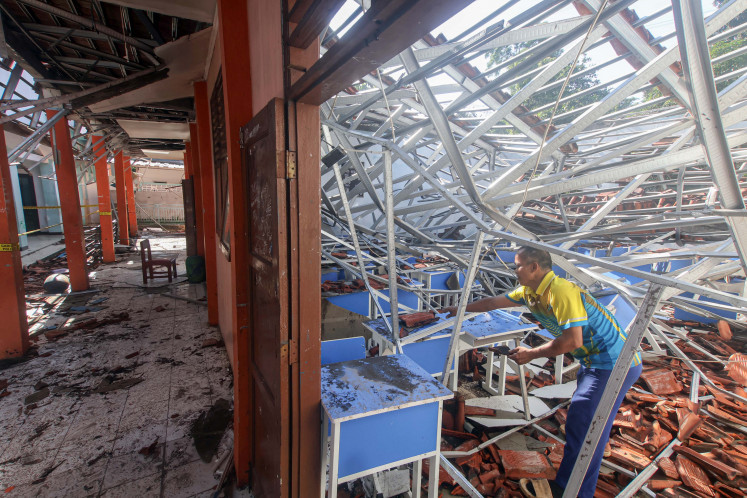Popular Reads
Top Results
Can't find what you're looking for?
View all search resultsPopular Reads
Top Results
Can't find what you're looking for?
View all search resultsEditorial: Aceh way for Papua
Last week’s ambush in two remote Papua areas that killed eight Indonesian Military (TNI) soldiers and four civilians is a strong reminder to the nation that peace remains elusive in the natural resource-rich province
Change text size
Gift Premium Articles
to Anyone
L
ast week’s ambush in two remote Papua areas that killed eight Indonesian Military (TNI) soldiers and four civilians is a strong reminder to the nation that peace remains elusive in the natural resource-rich province. If deadly attacks target security personnel, who are normally fully armed while on a stint in Papua, it is not exaggerating to jump to the conclusion that unarmed civilians will become easy prey to the gunmen.
Prior to the incidents, Papua had seen repeated attacks on police and military personnel believed to be perpetrated by Free Papua Organization (OPM) rebel group members. It is ironic and, therefore, begs the question: Does separatism remain alive in the province after almost 50 years of integration with the Republic?
As a sovereign state, Indonesia has the right to keep its territorial integrity intact through any legitimate means, including military operations, an option the country last used to end protracted rebellion in Aceh. The westernmost province came under a martial law during the tenure of president Megawati Soekarnoputri whose top security advisors included her coordinating minister for security and political affairs, Susilo Bambang Yudhoyono, now the President of Indonesia.
It was the peace talks with Aceh rebels that paid dividends and won compliments from the international community. Compromises, including the implementation of sharia which is not recognized in the Constitution, were unavoidable, but that was the price Indonesia had to pay to maintain Aceh as an integral part of its territory.
Strangely, the Yudhoyono administration has never taken the Aceh way into account when dealing with Papua, despite the fact that two provinces have many similarities, especially when it comes to independence aspiration and records of human rights abuses. Aceh and Papua are the only provinces that enjoy wide-ranging autonomy and, hence, whopping autonomy funds.
Yudhoyono opts for what he calls the welfare approach to address the decades of separatist movement in Papua. In 2013 alone his government allocated Rp 4.3 trillion (US$443 million) in special autonomy funds for Papua and Rp 1.8 trillion for neighboring West Papua. The package excludes tens of trillions of rupiahs the central government will disburse for infrastructure development in the two provinces.
Various reports, including those from the Supreme Audit Agency (BPK), have found, however, much of the special autonomy funds have never reached the people who need them the most, evidenced by the province’s high poverty rate. A number of Papua public officials have been convicted or accused of misusing the funds. Many appear to have wrongly implemented the “welfare approach”, which has turned out to enrich the elites.
Although claiming to avoid the “security approach”, the government has practically condoned the use of hard power, evident in the Army’s decision to expand two sub-province military commands in Papua under officers with a rank of brigadier general and future plan to form its third division of Strategic Reserves Command (Kostrad) strike force in Papua. Worse, the government has maintained the restriction of foreign journalists’ access to Papua for safety reasons, which not only indicates the province’s lack of security but also the government’s attempt to hide the truth about Papua from international exposure.
The government’s latest effort to bring long lasting peace to Papua took shape with the establishment of the Papua and West Papua Development Acceleration Unit (UP4B), led by former Aceh martial law commander Bambang Darmono. Apart from coordinating development in the two Papua provinces, the unit has reportedly approached rebel leaders to win their hearts and minds.
But with violence recurring and more lives lost, why does President Yudhoyono look reluctant to emulate the successful Aceh way in solving resentment in Papua once and for all?










